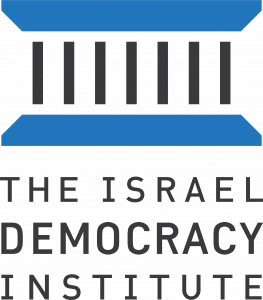Dr. Tehilla Shwartz Altshuler is a Senior Fellow at the Center for Democratic Values and Institutions, the head of the Media Reform Program and the Open Government Program at the Israel Democracy Institute. She joins hosts Dahlia Scheindlin and Gilad Halpern to discuss media policy in Israel and the way government interference may infringe on the country’s relatively robust freedom of the press.
Sponsors
This episode of the Tel Aviv Review was brought to you by the Israel Democracy Institute, an independent center of research and action dedicated to strengthening the foundations of Israeli democracy.









On censorship:
There are two forms of censorship: 1) the suppression (or misdirecting) of material facts of tactical reasons (does Israel have a nuclear bomb; is X and agent of Z; have troops been deployed; where do various budget items actually go); 2) the suppression of potential behavior by preventing speech which has no immediate material impact. The latter has crucial impact on issues orbiting terrorism, for networks and cells run in significant part on ideological fuel, just as agents of the State run on such fuel. A patriotic event can be seen as the production and consumption of cultural fuel related to national protection, however defined; one can expect State agents involved in the celebrated area to be uplifted by these events (perhaps even materially), and expect private groupings to provide ancillary support such as opinion venues explaining and praising State acts. We have strong natural reason to see speech as such as part of the engine allocating material effects, so as well reason to be suspicious of speech either not congruent with State goals or supporting, solely through words, agents against the State or people, or arguing State actions are misdirected to underlying goals. If speech can praise it can as well be blasphemous. Speech orders our lives and thought; other speech can be seen as disrupting that order.
Consider speech about God after natural disasters, such as the Lisbon earthquake of 1755. Some might say the event indicated either there is no God or He is malevolent; others that it indicates separation of ourselves from God or consequent of a lack of vigilance against sin. Since post-quake recovery relied heavily on God speech and ritual, the first option can be seen as a disruption of the engines of recovery, even in a micro sense of dealing with family bereavement, where religion can quell quarrel. Yet within critique of God lay the beginnings of a skeptical attitude which ultimately leads to the science of plate tectonics; in modern parlance, critique helped expand a space where the science of tectonics could form. We survive through social and cultural organization which can leave us blind to the real origins of an event. Moving toward that reality can disrupt the survival tools of the day. A draconian social policing against such blasphemy results, employing immediate social reinforcers (an upstanding, pious man, invited to the right gatherings, etc) to suppress thought defined as wrong not in direct empirical outcome but in ideological dissonance which is asserted to have a direct cultural impact (and so material outcome–the spirts will be displeased, God will turn away).
An example of the latter is the move to ban Breaking the Silence from speaking in high schools, to audiences soon to enter military service. BtS claims it discusses the actual facts of occupation; critiques seeking ban say that the ideological engine needed by young recruits is being damaged–that their very psyche risks harm by hearing BtS, perhaps even putting these young at risk. Nigh viscerally, BtS is portrayed as trying to separate youth from the nation, the overarching mode of survival for all.
Yet critical speech can seek to ground the social causes of an event, just as physics speech can seek to predict the trajectory of the moon. Our belief systems have to endure the world in some way, but that is not in itself to understand that world; rather, our beliefs may induce repeated great sacrifice which creates a kind of stability while actually neutral to real causes or in fact augmenting those causes: we may seem to have no choice but to induce the very things we defend against. If so, ignorance of real causes will be policed, simply for fear of the consequences of losing control of our beliefs and so social organization.
I see this dynamic repeatedly in Israel and the United States, in such areas as Gaza, occupation, global warming, and the Iraq War (I would add US health insurance as well). Speech is proclaimed a material attack. If Gaza heats up, anything decrying the Israeli position is a motivational aid to the enemy, suggesting alignment with that enemy. I think the early days of the Great Return March an excellent example of this dynamic. Soon Fridays were called “violence Friday” in news media, the question of how the March began shunted to Hamas puppeteering. I see this little different than claiming Satan as culprit in the Lisbon quake or in the Black Death. A material explanation of events will care not of your hopes and angers, save only as elements of the process. There will be no prayers to save the days.
This form of censorship is public and well as governmental–and it is insidious, for we all need to belong somewhere; when the social police are embedded in our private reality, we shut down. The government can fuel public vigilance, or it can stomp out thought early. I use “stomp” advisedly: not just to remove the offending instance, but to signal to others similar fate. If articulating the agency of networks becomes definitionally support for a terrorist network, social survival rests in silence. I think attacking news organizations or practitioners as “fake” rests on this dynamic as well. To declare someone “fake” is to warn others of that fate. Unable to understand, our final tool is condemnation.
And there is always so much we cannot understand.